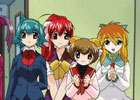Angel’s Tail
Japanese Title: Otogi Story: Tenshi no Shippo
| Also Known As: Angel Tales | ||
| Genre: Comedy/Romance | ||
| Format: 26 Episodes | ||
| Allegiance: Tokyo Kids | ||
| Director: Kazuhiro Ochi | ||
| Vintage: 2001 | ||
| Intelligence Agency Report by: Lady Sage | ||
| Mutsumi Goro has been having a bad time of things lately: he can’t get a job, he can’t get a girl, and his luck just plain sucks. But one day when he is caught in the rain, a mysterious fortune teller informs him that his luck will soon change, though he just brushes it off. But soon enough, maids from a place called Maid World that are reincarnations of his childhood pets start coming out of his cell phone. Maybe his luck is changing after all… | ||
|
|
||
| Field Agent Report by: Lady Sage | ||
| Plot Characters Impact Visual Audio |
7.00 8.00 7.50 8.50 8.00 |
|
| Overall | 7.75 | |
| (not an average) | ||
| Here we have all the elements of a typical shounen romance show. Lovable loser protagonist? Yup. A dozen girls, all of whom want said protagonist? Yup. Unlikely connection between said girls and said protagonist? You got it. Oodles of fan service? Surprisingly, no. Though Angel Tales may have all the trappings of yet another dopey shounen romance, instead we are given a surprisingly sweet, if superficial, romp through an unexpected mix of shounen and magical girl conventions.
With more characters than there are episodes, strong character development is nearly impossible to achieve. However, the maids do manage to each have a distinctive personality, even if some conform to harem show stereotypes. Goro, sadly, is exactly the same as every harem protagonist – hapless, geeky, but a nice guy underneath. Fortunately, most of the show is centered on the maids. Angel Tales is most comfortable when it is in episodic, character-oriented territory. However, once most of the maids have all had the secrets of their pasts revealed, the show moves into a magical-girl plot that seems awkward and forced and is not at all suitable for the charming, heartwarming nature of the show. The animation of Angel Tales is clean and well-done, as usual for TV animation of its time. The coloring is mostly done to match the mood, so for the majority of the series everything is very brightly colored. It’s interesting how the character designer managed to design each maid’s hair to suit her past life, and still look believable, implausible colors notwithstanding. The music, on the other hand, is wholly unremarkable. Angel Tales is probably not on the top of any anime fan’s to-watch list, and rightly so. There’s always a sense of “been-there, done-that” hanging over it, despite the cutesy fun. In fact, its best audience would be those new to anime who haven’t seen all the conventions used. Nevertheless, Angel Tales is worth a look to fans of harem shows, or those who have already seen most of what’s worth watching.
|
||




